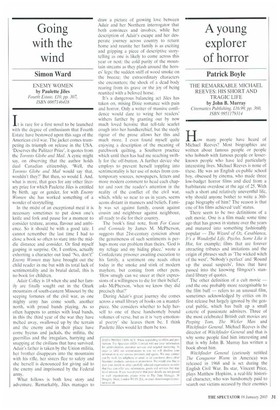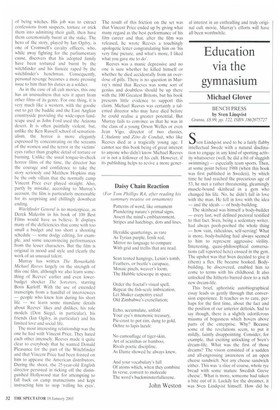A young explorer of horror
Patrick Boyle
THE REMARKABLE MICHAEL REEVES: HIS SHORT AND TRAGIC LIFE by John B. Murray Cinematics Publishing, £16.99, pp. 360, ISBN 0951179314 ow many people have heard of Michael Reeves? Most biographies are written about famous people or people who hobnob with famous people or lesserknown people who have led particularly interesting lives. Michael Reeves is none of these. He was an English ex-public school boy, obsessed by cinema, who made three low-budget horror films and died from a barbiturate overdose at the age of 25. With such a short and relatively uneventful life, why should anyone bother to write a 360page biography of him? The reason is that one of his films achieved 'cult' status.
There seem to be two definitions of a cult movie. One is a film made some time ago that has grown in stature over the years and matured into something fashionably popular — The Wizard of Oz, Casablanca, It's a Wonderful Life, Psycho, Some Like it Hot, for example; films that are forever attracting tributes and imitations and the origin of phrases such as 'The wicked witch of the west', 'Nobody's perfect' and 'Round up the usual suspects', lines that have passed into the knowing filmgoer's standard library of quotes.
The other definition of a cult movie — and the one probably more recognisable to the film buff — refers to an unusual film, sometimes acknowledged by critics on its first release but largely ignored by the general public, which has built up a small coterie of passionate admirers. Three of the most celebrated British cult movies are Peeping Tom, The Wicker Man and IVitchfinder General. Michael Reeves is the director of Witchfinder General and that is why some people find him interesting and that is why John B. Murray has written a book about him.
Witchfinder General (curiously retitled The Conqueror Worm in America) was released in 1968 and is set during the English Civil War. Its star, Vincent Price, plays Matthew Hopkins, a real-life historical character, who was handsomely paid to search out victims accused by their enemies of being witches. His job was to extract confessions from suspects, torture or trick them into admitting their guilt, then have them ceremonially burnt at the stake. The hero of the story, played by Ian Ogilvy, is one of Cromwell's cavalry officers, who, while away fighting for the parliamentary cause, discovers that his adopted family have been tortured and burnt by the witchfinder and his fiancee raped by the witchfinder's henchman. Consequently, personal revenge becomes a more pressing issue to him than his duties as a soldier.
As in the case of all cult movies, this one has an unusualness that sets it apart from other films of its genre. For one thing, it is very much like a western, with the goodie Out to get the baddie and the East Anglian countryside providing the wide-open landscape used as John Ford used the Arizona desert. It is often painfully violent, but, unlike the Ken Russell school of sensationalism, the horror is more elegantly expressed by concentrating on the screams of the women and the terror in the victims' eyes rather than graphic detail of torture or burning. Unlike the usual tongue-in-cheek horror films of the time, the director has the courage and confidence to take the story seriously and Matthew Hopkins may be the only villain that the normally camp Vincent Price ever played straight. Also, partly by mistake, according to Murray's account, the film is particularly memorable for its surprising and chillingly downbeat ending.
Witchfinder General is no masterpiece, as Derek Malcolm in his book of 100 Best Films would have us believe. It displays many of the deficiencies that come with too small a budget and too short a shooting schedule — some dodgy editing, for example, and some unconvincing performances from the lesser characters. But the film is original in mood and style and clearly the work of an unusual talent.
Murray has written The Remarkable Michael Reeves largely on the strength of this one film, although we also learn something of Reeves' earlier and even lowerbudget shocker The Sorcerers, starring Boris Karloff. With the use of extended transcripts from a handful of interviewees — people who knew him during his short life — we learn some mundane details about Reeves' likes and dislikes, his role models (Don Siegel, in particular). his friends (Ian Ogilvy, in particular) and his limited love and social life.
The most interesting relationship was the one he had with Vincent Price. They hated each other intensely. Reeves made it quite clear to everybody that he wanted Donald Pleasance for the part of the Witchfinder and that Vincent Price had been foisted on him to appease the American distributors. During the shoot, the 25-year-old English director persisted in ticking off the distinguished Hollywood star for attempting to fall back on camp mannerisms and kept instructing him to stop 'rolling his eyes'. The result of this friction on the set was that Vincent Price ended up by giving what many regard as the best performance of his film career and that, after the film was released, he wrote Reeves a touchingly apologetic letter congratulating him on his very fine picture, and what's more, I liked what you gave me to do'.
Reeves was a manic depressive and no one is sure whether he killed himself or whether he died accidentally from an overdose of pills. There is no question in Murray's mind that Reeves was some sort of genius and doubtless should be up there with the 100 Greatest Britons. but his book presents little evidence to support this claim. Michael Reeves was certainly a talented director who may have died before he could realise a greater potential. But Murray fails to convince us that he was in the class of a young Orson Welles or even Jean Vigo, director of two classics, L'Atalante and Zero de Conduit, who like Reeves died at a tragically young age. I cannot see this book being of great interest to anyone who didn't know Michael Reeves or is not a follower of his cult. However, if its publishing helps to revive a more gener al interest in an enthralling and truly original cult movie, Murray's efforts will have all been worthwhile.



























































 Previous page
Previous page